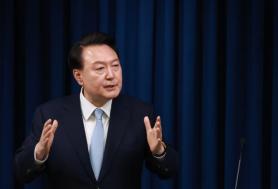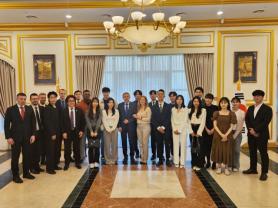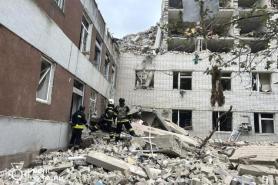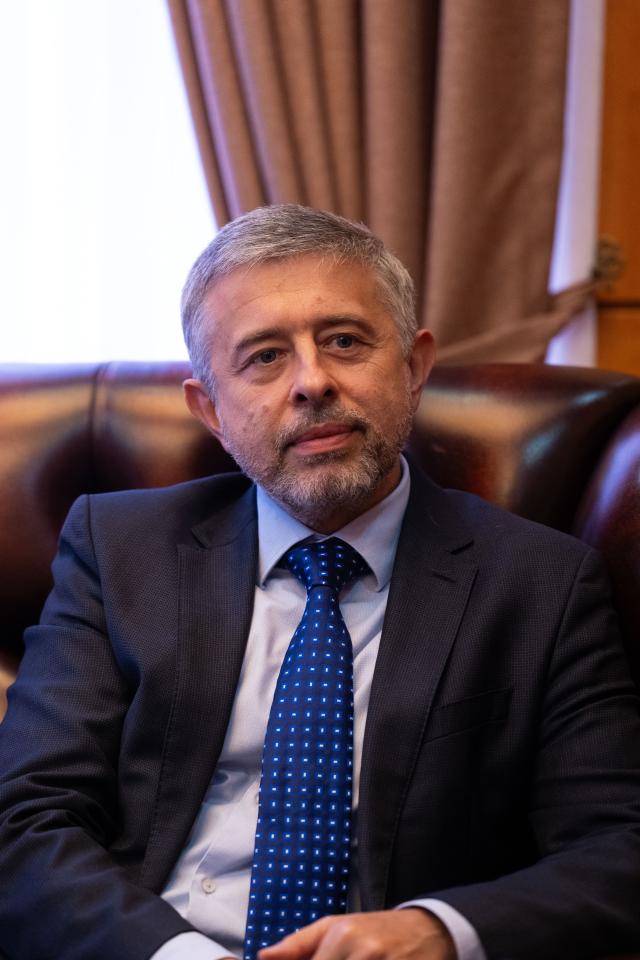
SEOUL, May 10 (AJU PRESS) - Amid frozen diplomatic relations between South Korea and Russia, mainly stemming from the two countries' different perspectives on the ongoing war in Ukraine, Russian Ambassador to South Korea Georgy Zinoviev has admitted the strain, but expressed hope for improvement.
"Currently, both Russia and South Korea are facing challenges in the diplomatic arena. But we believe that there is still a chance for both countries to recover and further enhance the mutual relationship," the envoy said in an exclusive interview held in the Russian Embassy in central Seoul on May 3.
Zinoviev started talks by emphasizing that Moscow's diplomatic relationship with Seoul is very different from the one with Western countries, including the U.S. "From what I see, Russia's relationship with Western countries has reached its worst point, i.e., full confrontation, and there looks to be no room for recovery at this point," Zinoviev sighed.
He saw the source of the deterioration in the ties between the two countries as stemming from outside factors. Russophobia erupted in many Western countries following Russia's "special military operation" into Ukraine in February 2022, with anti-Russian sentiment spreading over several years, according to the envoy. However, Zinoviev noted that South Korea took a different stance, as it did not join other countries in showing fear or hatred toward Russia.
"There is a saying, 'You must compare to see the truth.' That means your perspective can differ based on what you compare," Zinoviev said, sharing the phrase to give a clue on how to approach diplomatic relationships. "For example, Russia's relationship with South Korea has significantly worsened in recent years, but that does not seem so bad when compared to Russia's relationship with Western countries," he said.
Zinoviev was cautiously optimistic about the outlook for the ties between the two countries. "I believe that there is still hope for us, considering that our friendship has not been completely destroyed," he said. "But it is still very fragile and needs delicate approaches."
The diplomatic relationship between South Korea and Russia was formed some 140 years ago, when the Joseon Dynasty (1392~1897) signed the Treaty of Friendship and Commerce with the Russian Empire in 1884. The friendship between the two countries was not always in a good mood, but the relationship has been smooth for the last 30 years until Russia declared a special military operation into Ukraine in February 2022.
In response to Russia's full-scale military action against Ukraine, South Korea maintained a firm policy of refraining from selling weaponry and ammunition to countries at war and was able to provide humanitarian aid to Ukraine, without provoking Russia.
But the situation escalated dramatically following the leak of secret intelligence documents from the U.S. in April 2023. These documents revealed that Seoul had been replenishing the ammunition stocks of the U.S. and Poland while also selling tanks, howitzers, and ammunition to Poland, ostensibly to replace the military equipment diverted to Ukraine.
"I think that, if South Korean weaponry is sent to Ukraine, it could violate international laws and such accusations currently draw extremely negative reaction from Russia as the weapons and ammunition could be used against Russian soldiers and people," Zinoviev said, stressing that would only prolong the war. But he downplayed the impact such assistance would have on the war's outcome.
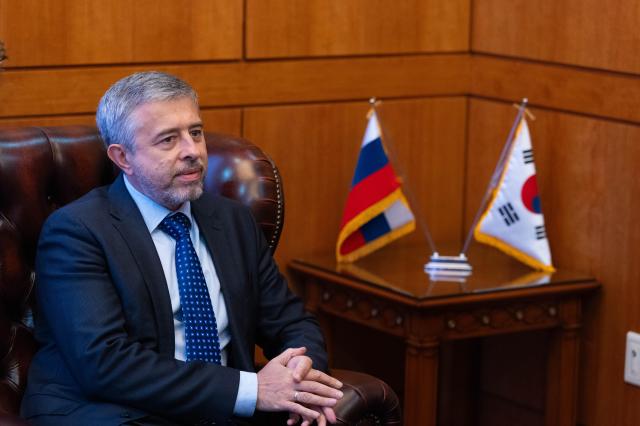
Zinoviev claimed that despite the diplomatic pause, there are potentials, possible key solutions to resolving the current stalemate between South Korea and Russia.
"Firstly, direct flight routes from Incheon to Moscow should be resumed," Zinoviev said, explaining that civil-level communication and exchanges should continue regardless of political circumstances. Every relationship begins with human interactions, he said.
He then came up with another solution, the need to boost cultural exchanges between the two countries to thaw the frozen relationship. Many Russian arts and literature are favored by South Koreans. Russian performances including classical music and ballet are especially popular in South Korea.
A ballet performance titled "Modance," featuring Svetlana Zakharova, the Ukrainian-born Russian principal dancer of the Iconic Bolshoi Ballet, was supposed to be held at the Seoul Arts Center for five days in April, but the center operated by South Korea's culture ministry called off the performance in March.
The sudden cancellation was made about two weeks after the Embassy of Ukraine in Seoul heavily criticized the ballet dancer for expressing support of Russian President Vladimir Putin. The Russian Embassy had expressed deep regrets over the cancellation and claimed that some foreign diplomatic representatives organized an "unscrupulous campaign" to discredit the performance.
"The fact that the performance was canceled was a big shock for us….. I never thought envoys from Western countries would conduct such an unscrupulous action towards Russia's cultural content," Zinoviev said. "The arts sector should be kept away from politics. It should be dealt with separately. Arts should not be used as a political tool."
Zinoviev said he now doubts whether any Russian arts performance or exhibition would be ever showcased in South Korea without any interference from other countries. "If South Korea continues to be swayed by western rhetoric, it would only deteriorate the relationship between South Korea and Russia," he said.
Zinoviev also commented on Russia's relationship with North Korea, stating Moscow's intention to strengthen ties with the isolated country. "Pyongyang is expressing full support for Moscow and it would be strange for Russia not to further strengthen its relationship with North Korea," he claimed.
Zinoviev stressed that no international law was violated in its relationship with North Korea. Western media insist that Russia and North Korea are violating the United Nations sanctions, but the envoy finds such claims groundless.
Looking towards the future, Zinoviev expressed expectations for improved relations between Russia and two Koreas.
Zinoviev concluded the interview by emphasizing the importance of youth exchange programs and international events in fostering better communication and mutual understanding. He cited young South Korean students and startup entrepreneurs' recent participation in the week-long World Youth Festival near Sochi in March as a positive sign. Russia, he added, is planning a new global event focused on promoting exchanges among young people.
"We need more big events where young people can directly communicate with their counterparts from other countries and share their thoughts. Russia is also preparing new events that will boast new forms of interaction and communication among teenagers and those in their 20s," the envoy said.
Copyright ⓒ Aju Press All rights reserved.


